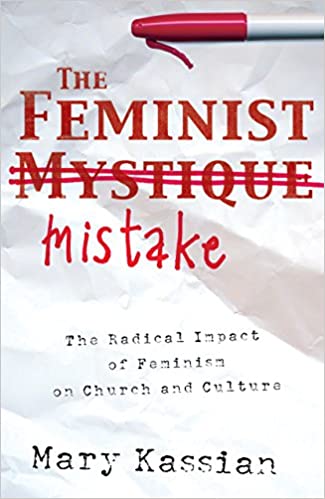A Brief Book Summary from Books At a Glance
by Kirsten Birkett
About the Αuthor
Mary Kassian is an award-winning author, popular speaker, and a distinguished professor of women’s studies at Southern Baptist Seminary. She has published several books, Bible studies and videos, including: Girls Gone Wise, In My Father’s House: Finding Your Heart’s True Home, Conversation Peace, Vertically Inclined, and The Feminist Mistake.
General Summary
A history of twentieth-century feminism, organized around the themes of the right to name (self, world, and God), demonstrating the confluence of secular feminism and theological feminism, and some of the profound outcomes in society.
Contents
Part One: The Philosophical Quake
Stage One: Naming Self
- The Problem Without a Name
- A Problem in the Church
- The Church and the Second Sex
- Biology Equals Destiny
- Feminist Liberation Theology
- The Personal Becomes Political
Stage Two: Naming the World
- Woman-centered Analysis
- Woman-centered Analysis of Theology
- The First Sex
- Herstory
- Women’s Studies
Stage Three: Naming God
- The Feminization of God
- Changing of the Gods
- Going Too Far: The Feminist Metaphysic
- Household of Freedom
- Godding
- Women-Church
Part Two: Shock Waves
- The Tide Converges
- On Evangelical Shores
- Drifting Away
- Into the Mainstream
- Against the Tide
- Flow Charts: The Development of Feminism
Introduction: The Tsunami of Feminism
From 1960-1990, the philosophy of feminism shook society, but the consequences are continuing like a tsunami. The Judeo-Christian view on men, women, and family has been deconstructed with astonishing speed, with widespread increase in gender confusion and conflict.
Part I of this book examines the development of feminism through its deconstruction of a view of womanhood, manhood, gender relationships, family, and the Judeo-Christian worldview, leading to metaphysical pluralism, self-deification, and the rejection of God. This book also:
- does not debate the validity of the questions feminism posed, but its answers
- sees religious feminist theology not as a result of secular feminism, but a movement concurrent to it
- discusses feminism in general from its presuppositions, not particular strands of feminism
- argues that despite opposition to points of feminist philosophy, it still developed as described.
Part II of the book examines events since 1990. . . .
[To continue reading this summary, please see below....]The remainder of this article is premium content. Become a member to continue reading.
Already have an account? Sign In
